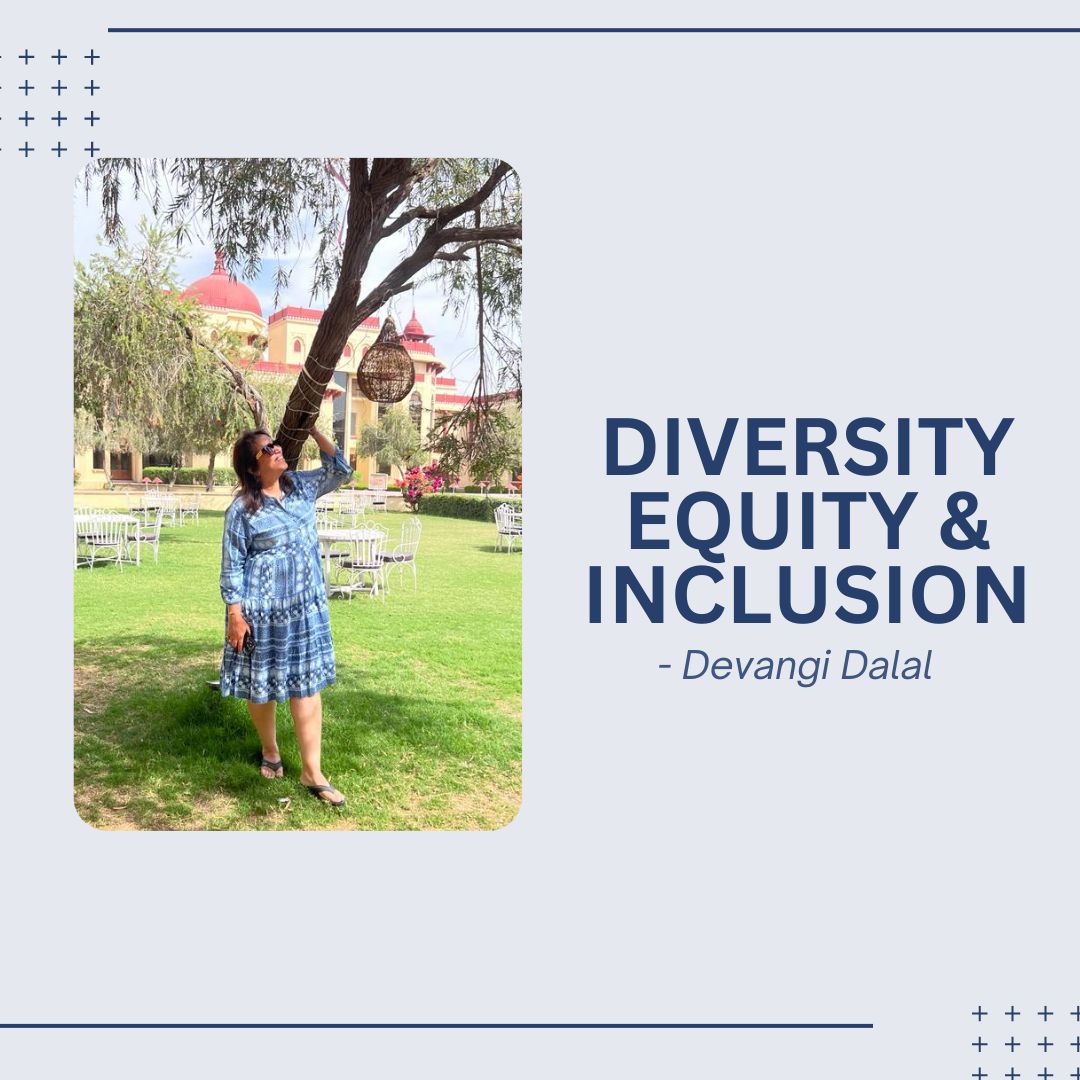|| Diversity Equity and Inclusion ||
|| Diversity Equity and Inclusion ||
In today's time, it's a hot topic. After the Pandemic, everywhere in business, healthcare, or any other sector, the importance of understanding the concepts of diversity, equity, and inclusion has come more into practice. People have started noticing that if importance is not given, everything will be affected. While listening to these three words by one of the speakers, I felt logical that this is so important in day-to-day life situations as well. As a medical practitioner, I see so many clients from diverse cultures, religions, and environments. For me, all clients are equal, though they come from different economic conditions. For me, it is also important to look at all the specially-abled kids in a similar manner, and my duty is to minimize their challenges and to include them in normal society so that they feel warmth and comfort and that they do belong to the society of so-called humans in this universe. I believe kindness will flourish when we are able to include these specially abled children in our society, as well as when we include each and every human being in our lives with love and respect.
This universe is a vicious cycle, and we all have to be in that cycle created by God. We all differentiate ourselves with different religions, castes, and creed, follow many different rituals, and do prayers for the God whom we follow, and many such vicious cycles we have been moving in for many years, but I feel that when we take birth in this universe and go to kindergarten, primary, secondary, or higher education, schools may be following any language, but those school authorities never make the terminology that only certain community members will get admissions. You get admission to schools according to your capacity to pay for education. Education, as such, has to be run with equity, despite the diversity of communities. In a similar way, any university giving admissions to a variety of degree colleges has to also give admissions according to capacity to pay. Every education system is designed in such a way that any individual can apply depending on their capacity to pay and their best potential.
If you go to any corporate company where a number of people work, they are all employed depending on their education and caliber. Even if they are admitted to any healthcare center for individual treatment, they are admitted and treated. None of the corporate or healthcare systems has a security mechanism that can help them differentiate caste, creed, and religion. When you go to buy vegetables or anything else in the mall, you don't see who is giving you the material you want, who has made it, or from whom you are purchasing it. You only go to the market to buy the things that you need. Those politicians who work with people during their campaign or celebrities who work in films to entertain their people—so many people are required to make films—don't go and see each and every area of life to see which people are there and whom they are working with; they only see how they can earn money, how work is done for them, and how well they can generate money to work in the entertainment world.
In my school days, there was a very simple chapter on communication that says every individual cannot do every job, so he or she needs the support of many different individuals coming from different environments, communities, or countries. Our ancestors have taught us that when you are an individual, work for your self-respect, but when it comes to a community or country, work as a team. In the same way, our soldiers come together from any community and religion to work for our own country. Lord Krishna has very well narrated in the Bhagavad Gita that those individuals who understand in depth the reality of diversity, equity, and inclusion and balance the stability of mind, body, and soul to survive in this universe are the individuals who have immense faith in God, and they are the individuals who can make a change in the world. Those who don't understand only differentiate people by their religion, caste, and in many other ways.
I have been attending many international conferences till now, where every time more emphasis was given to theoretic knowledge, research, and technology areas. This is the first time I've heard many lectures on diversity, equity, and inclusion. I also learned new terminology called "social prescription" rather than "medical prescription." There is research happening all around the world that shows that to make any research or new development in health care or in any other area and to improve equity, those parameters should be easy to access, it should be person-centered, there should be quality in executing anything, and it has to show efficiency so that every individual feels part of it (inclusion) and they feel they belong to that project, or you can say part of this society or part of this universe.
If I had to put it simply, our great curiosity for any subject in education, health, career, or socialization arises when we have to work for ourselves, analyze ourselves, or work with our family members. But what about when we have to work for others? We honestly reflect on ourselves at that moment, we develop empathy or may require compassion to solve the problem, we provide modest acknowledgment occasionally, you kindly do this for you and for "I won't have any complaints, I'll try my best to carry it out, and many other things." Today's significant development barriers result from our emphasis on factors like ethnicity, cultural background, religious tradition, preferred language, and an individual's participation in the process. Just give it some serious thought wherever you are—at home, at work, in the workplace, in your social life—anywhere these limits are taken into account and given more weight than moving forward as together.
Today in our industry, a lot of revolution in technology has happened, but still, research and innovation take a lot of time as these parameters play a very important role. But if we as individuals play a sensible role as professionals if we concentrate on identifying the problem, do the correct diagnosis, and working on identifying, reviewing, and selecting knowledge that we can implement, the growth in the hearing revolution will be much faster. This can be implemented in any other profession, at work, or dealing with any relationships in life. Concentration should be such that it should be educative (evidence-based) though it may have diversity, it should be inclusive (integrated to make decisions and for teamwork), it should have an understanding of technology, infrastructure structure, and integrity, and it should train people that with diversity, equity, and inclusion we can have a better and happier life.
We should have social awareness that we are in the scientific revolution, but still, at this date, the research says our brain gives more value to our social and emotional intelligence than just intelligence. We receive 11 million bits of information every second in our brain, but we can only consciously process 40 bits every second. Science says 99.999996% of the unconscious mind responds. There is a huge understanding required between your institution and your reflexive behavior. You just ask simple things related to your environment, like, does your doctor have a similar thought process and energy as you? Like that, so many questions make us realize that, though we have diversity, we need to understand equity and feel and make others feel included so that only we and the society around us will be better able to survive.











Very nicely written.
ReplyDelete